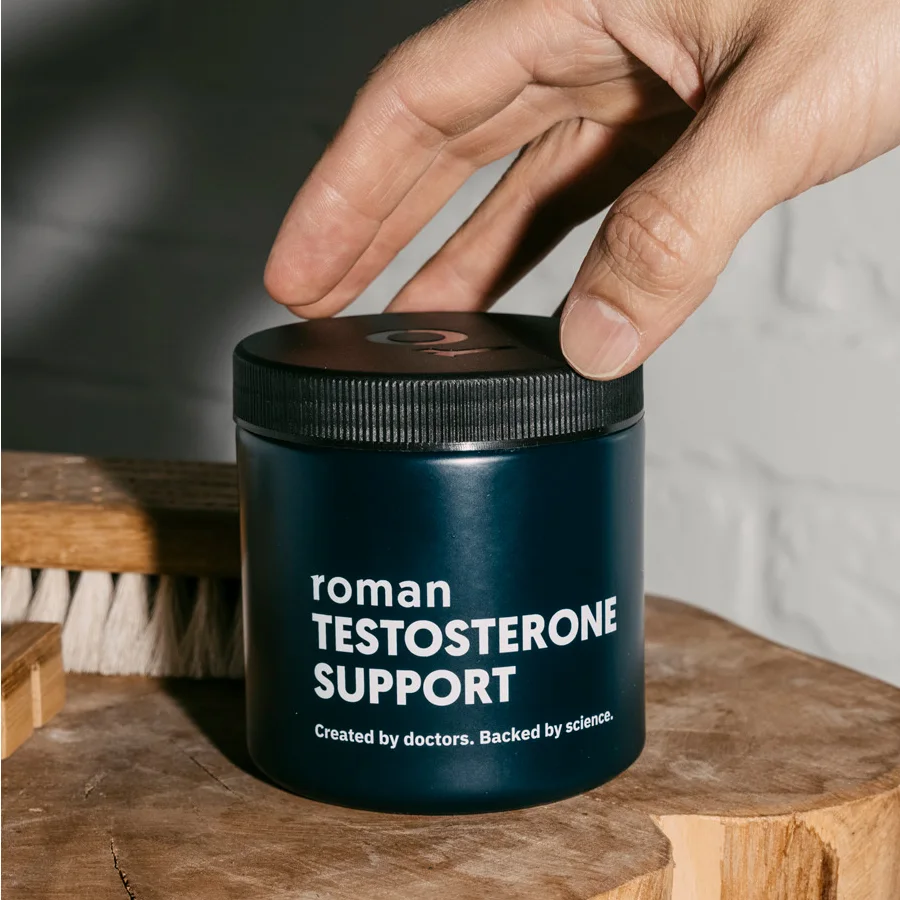Here's what we'll cover
Here's what we'll cover
Here's what we'll cover
Testosterone is a sex hormone present in both men and women. This hormone impacts a person’s fertility, sexual function, and ability to build lean muscle mass.
Sometimes, testosterone levels fall below the normal range (low testosterone, or low T). Testosterone naturally decreases as we age, but low T can also be caused by stress, injury, trauma, some medical conditions, and some medications.
In men, low testosterone may cause symptoms like low sex drive, erectile dysfunction, fatigue, and more (Nassar, 2022; Sizar, 2021). Fortunately, there are many ways to support healthy testosterone levels, like incorporating foods to boost testosterone into your diet. Foods that support testosterone levels include fatty fish, dark chocolate, and more. Continue reading to learn about 10 foods that may help boost testosterone.
Foods that boost testosterone
Try incorporating these foods that may boost testosterone into your diet:
1. Fatty fish
A few types of fatty fish include:
Salmon
Sardines
Trout
Mackerel
Tuna
Herring
Fatty fish contain multiple healthy nutrients like vitamin D, zinc, and omega-3 fatty acids.
Omega-3s can help reduce inflammation, regulate blood pressure, and lower heart disease risk (Gammone, 2019). The three main types of omega-3 fatty acids are EPA, DHA, and ALA. Both EPA and DHA are found in fish, while ALA is mainly found in plant-based foods like nuts and seeds.
In addition to the heart health benefits, some research suggests EPA and DHA supplementation could increase testosterone levels in some men (Abbott, 2020). However, results are conflicting, and other studies don’t show an impact of EPA and DHA supplementation on testosterone levels.
Additionally, extremely low-fat diets have been associated with decreases in testosterone levels. Given that cholesterol is an essential building block of testosterone, this doesn’t necessarily come as a surprise. However, further research is needed (Whittaker, 2021).
2. Dark leafy greens
Leafy green vegetables like kale or spinach are good sources of fiber, micronutrients, antioxidants, and minerals like magnesium.
A 2011 study of older men found that magnesium intake was associated with higher testosterone levels (Maggio, 2011). Another study found that diets low in dark leafy greens (and other elements, such as dairy) were associated with poorer testicular function and lower testosterone levels (Kurniawan, 2021).
3. Cocoa and dark chocolate
Dark chocolate and cocoa products are a source of magnesium and flavonoid antioxidants. Flavonoid antioxidants can help protect cells from damage caused by free radicals and oxidative stress.
A 2020 study found flavonoids and isoflavonoids may help increase testosterone levels. However, the study was small and more research is needed (Martin, 2020).
4. Avocados
Avocados are a trendy food because of their versatility. They’re packed with nutrients like fiber, protein, magnesium, vitamin E, healthy fats, and a trace mineral called boron.
Research has yielded mixed results, but increasing boron intake may help increase some people's magnesium absorption and testosterone levels (Pizzorno, 2015).
5. Berries and pomegranates
Fruits like berries, cherries, and pomegranates are loaded with antioxidants, like the flavonoids called quercetin, myricetin, and kaempferol. Flavonoid antioxidants may help protect cells from damage and improve testosterone levels (Martin, 2020).
A small 2012 study found taking pomegranate juice daily for two weeks increased testosterone levels in saliva (Al-Dujaili, 2012).
6. Shellfish
Shellfish like oysters, clams, and shrimp are excellent sources of selenium, omega-3s, and zinc.
Zinc is an important mineral for reproductive health and hormone levels. Zinc deficiency can lead to decreased testosterone production. For people with a zinc deficiency, increasing foods with zinc or adding a zinc supplement may increase testosterone levels (Santos, 2020).
7. Ginger
Ginger is a root plant used in cooking and traditional medicine.
One review indicated that ginger might protect against oxidative stress and increase testosterone levels (Banihani, 2018).
Evidence is limited, and the effects of ginger on testosterone haven’t been confirmed in humans. But consider adding ginger to your diet for the antioxidant benefits, and increased testosterone might be an added benefit.
8. Vitamin D
While not technically a food in and of itself, vitamin D is found in foods including beef liver, tuna, salmon, and swordfish. A 2010 study found that vitamin D supplementation in those with lower vitamin D levels may increase testosterone levels, though more research is needed (Pilz, 2011).
9. Olive oil
Extra virgin olive oil is a good source of vitamin E and vitamin K, and is very easy to incorporate into your diet. A small 2013 study found that taking olive oil could positively impact testosterone levels (Derouiche, 2013).
10. Onions
Onions are a staple ingredient for adding flavor to meals and are a source of antioxidants, vitamin C, folate, and potassium.
Multiple research studies have linked onions with an impact on testosterone levels. It’s believed that onions may help protect against declining testosterone levels through antioxidant effects and promoting nitric oxide production, among other methods (Banihani, 2019).
Foods to avoid
Not all foods are created equal when it comes to testosterone. In fact, some foods are linked to potentially lower testosterone levels. Here are some of the foods to avoid consuming in excess:
Processed foods
A diet high in processed foods, omega-6 fatty acids, and trans fatty acids might be linked to lower testosterone levels (Kurniawan, 2021; Minguez-Alarcón, 2017).
Often, processed foods are high in salt, fat, sugar, and calories but low in important nutrients. Limiting the number of processed foods in your diet and focusing on eating fresh, whole foods when possible may benefit your overall health.
Foods packaged in BPA-containing plastic
BPA-containing plastic has been linked to several health concerns, including disrupting hormone levels. A 2013 study found a potential association between high levels of BPA in the blood and decreased testosterone levels in men (Zhou, 2013). More research is needed, however.
Alcohol
Excessive alcohol intake has also been linked with a negative impact on sperm production and problems with the testicles.
Occasional drinking is less likely to impact your testosterone levels. However, heavy drinking is more likely to decrease testicular function (Duca, 2019).
Other ways to boost testosterone
In addition to diet, living a healthy lifestyle can positively impact your testosterone levels and provide other health benefits. Here are some lifestyle changes that may support healthy testosterone levels:
Maintain a healthy weight
Maintaining a healthy weight is important for multiple areas of your overall health and well-being. Research suggests that BMI, obesity, waist circumference, fat mass, and muscle mass that fall outside normal ranges can contribute to lower testosterone levels (Ko, 2021).
Try strength training
Some research suggests strength training 5–7 days a week could be associated with a lower risk for low testosterone. Exercises for strength training are designed to build muscle mass. These exercises typically involve lifting weights or bodyweight exercises to strengthen muscles (Ko, 2021).
Quit smoking
Smoking negatively impacts health in a number of ways, including testosterone levels. A 2021 study found potentially beneficial effects of smoking cessation on testosterone levels (Ko, 2021).
Testosterone replacement therapy
Testosterone replacement therapy (TRT) is a treatment used to increase testosterone levels in people diagnosed with low testosterone. Testosterone replacement therapy can be delivered using injections, patches, gels, or pills.
Keeping your testosterone levels within a healthy range is beneficial for a variety of reasons. Eating a balanced diet that includes nutrient-rich foods is one of the ways you can support healthy testosterone levels. If you have concerns about low T, make an appointment with your healthcare provider to create a plan that’s right for you.
DISCLAIMER
If you have any medical questions or concerns, please talk to your healthcare provider. The articles on Health Guide are underpinned by peer-reviewed research and information drawn from medical societies and governmental agencies. However, they are not a substitute for professional medical advice, diagnosis, or treatment.
References
Abbott, K., Burrows, T. L., Acharya, S., et al. (2020). Dietary supplementation with docosahexaenoic acid rich fish oil increases circulating levels of testosterone in overweight and obese men. Prostaglandins, Leukotrienes, and Essential Fatty Acids , 163 , 102204. doi:10.1016/j.plefa.2020.102204. Retrieved from https://pubmed.ncbi.nlm.nih.gov/33221700/
Al-Dujaili, E. & Smail, N. (2012). Pomegranate juice intake enhances salivary testosterone levels and improves mood and well being in healthy men and women. Endocrine Abstracts, 28. Retrieved from https://www.endocrine-abstracts.org/ea/0028/ea0028p313
Banihani, S. A. (2018). Ginger and testosterone. Biomolecules , 8 (4), 119. doi:10.3390/biom8040119. Retrieved from https://www.ncbi.nlm.nih.gov/pmc/articles/PMC6316093/
Banihani, S. A. (2019). Testosterone in males as enhanced by onion ( Allium Cepa L. ). Biomolecules , 9 (2), 75. doi:10.3390/biom9020075. Retrieved from https://www.ncbi.nlm.nih.gov/pmc/articles/PMC6406961/
Derouiche, A., Jafri, A., Driouch, I., et al. (2013). Effect of argan and olive oil consumption on the hormonal profile of androgens among healthy adult Moroccan men. Natural Product Communications , 8 (1), 51–53. Retrieved from https://pubmed.ncbi.nlm.nih.gov/23472458/
Duca, Y., Aversa, A., Condorelli, R. A., et al. (2019). Substance abuse and male hypogonadism. Journal of Clinical Medicine , 8 (5), 732. doi:10.3390/jcm8050732. Retrieved from https://www.ncbi.nlm.nih.gov/pmc/articles/PMC6571549/
Gammone, M. A., Riccioni, G., Parrinello, G., et al. (2019). Omega-3 polyunsaturated fatty acids: benefits and endpoints in sport. Nutrients , 11 (1), 46. doi:10.3390/nu11010046. Retrieved from https://www.ncbi.nlm.nih.gov/pmc/articles/PMC6357022/
Ko, D. H., Kim, S. E., & Lee, J. Y. (2021). Prevalence of low testosterone according to health behavior in older adult men. Healthcare , 9 (1), 15. doi:10.3390/healthcare9010015. Retrieved from https://www.ncbi.nlm.nih.gov/pmc/articles/PMC7824172/
Kurniawan, A. L., Hsu, C. Y., Chao, J. C., et al. (2021). Association of testosterone-related dietary pattern with testicular function among adult men: A cross-sectional health screening study in Taiwan. Nutrients , 13 (1), 259. doi:10.3390/nu13010259. Retrieved from https://www.ncbi.nlm.nih.gov/pmc/articles/PMC7830687/
Maggio, M., Ceda, G. P., Lauretani, F., et al. (2011). Magnesium and anabolic hormones in older men. International Journal of Andrology , 34 (6 Pt 2), e594–e600. doi:10.1111/j.1365-2605.2011.01193.x. Retrieved from https://pubmed.ncbi.nlm.nih.gov/21675994/#
Martin, L. J. & Touaibia, M. (2020). Improvement of testicular steroidogenesis using flavonoids and isoflavonoids for prevention of late-onset male hypogonadism. Antioxidants , 9 (3), 237. doi:10.3390/antiox9030237. Retrieved from https://www.ncbi.nlm.nih.gov/pmc/articles/PMC7139932/
Mínguez-Alarcón, L., Chavarro, J. E., Mendiola, J., et al. (2017). Fatty acid intake in relation to reproductive hormones and testicular volume among young healthy men. Asian Journal of Andrology , 19 (2), 184–190. doi:10.4103/1008-682X.190323. Retrieved from https://www.ncbi.nlm.nih.gov/pmc/articles/PMC5312216/
Nassar, G. N. & Leslie, S. W. (2022). Physiology, testosterone. StatPearls . Retrieved on April 12, 2022 from https://www.ncbi.nlm.nih.gov/books/NBK526128/
Pilz, S., Frisch, S., Koertke, H., et al. (2011). Effect of vitamin D supplementation on testosterone levels in men. Hormone and Metabolic Research , 43 (3), 223–225. doi:10.1055/s-0030-1269854. Retrieved from https://pubmed.ncbi.nlm.nih.gov/21154195/
Pizzorno, L. (2015). Nothing boring about boron. Integrative Medicine , 14 (4), 35–48. Retrieved from https://www.ncbi.nlm.nih.gov/pmc/articles/PMC4712861/
Santos, H. O. & Teixeira, F. J. (2020). Use of medicinal doses of zinc as a safe and efficient coadjutant in the treatment of male hypogonadism. The Aging Male : The Official Journal of the International Society for the Study of the Aging Male , 23 (5), 669–678. doi:10.1080/13685538.2019.1573220. Retrieved from https://pubmed.ncbi.nlm.nih.gov/30767598/
Sizar, O. & Schwartz, J. (2021). Hypogonadism. StatPearls . Retrieved on April 12, 2022 from https://www.ncbi.nlm.nih.gov/books/NBK532933/
Whittaker, J. & Wu, K. (2021). Low-fat diets and testosterone in men: Systematic review and meta-analysis of intervention studies. The Journal of Steroid Biochemistry and Molecular Biology , 210 , 105878. doi:10.1016/j.jsbmb.2021.105878. Retrieved from https://pubmed.ncbi.nlm.nih.gov/33741447/
Zhou, Q., Miao, M., Ran, M., et al. (2013). Serum bisphenol-A concentration and sex hormone levels in men. Fertility and Sterility , 100 (2), 478–482. doi:10.1016/j.fertnstert.2013.04.017. Retrieved from https://pubmed.ncbi.nlm.nih.gov/23651625/










